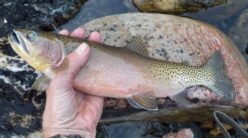Bow hunting season has already started, and many of us are in the process of getting ready for the any-weapon season to start in October. With the number of hunters that are now and will be taking to the field in the next few weeks, I always expect that there will be some problems such as getting lost, bumps and bruises, hypothermia and dehydration.
Several years ago, I wrote about a hunter that my son and I found wandering in the area that we were hunting. He was weak, dehydrated and disoriented. I remember thinking at the time that it was just unbelievable that he could have been that far into the mountains we were hunting in, without water, topographic map and compass, food or a backpack with a few items in case of trouble.
The pioneers whom we like to try and emulate in our hiking, camping and hunting, lived in a era when their daily existence necessitated being able to cope with natural hazards to their survival. In their day, all travel was regulated by weather and terrain, not a time schedule.
In spite of the many things that technology has provided for us to make travel safer in the backcountry there is no substitute for experience and knowledge of potential dangers of traveling in wilderness areas when we go hunting or camping for several days.
Whereas we expect warnings such as signs, traffic lights and flags as we move around civilization, and rely on telephones to call for help, we sometimes forget there are no warning signs of danger in natural wilderness areas and we may not have cell phone service.
We all must be self sufficient when hunting, hiking and camping in the wilderness. We need to anticipate the problems we may run into and recognize places we should avoid. Ask yourself: can my body take the strain and punishment this trip will demand under the prevailing conditions? Will I have the food necessary to replace the energy my body uses? Will I have extra food if I am unexpectedly delayed? What will I use for shelter? What will I use for warmth, extra clothing, and fire building, if I get chilled? Are my boots and equipment up to this trip?
You should plan and prepare for yourself. Depending on others to bring food, warmth and shelter is foolhardy. Depending on others to navigate and study the terrain will not help you if you become separated while on the outing. Have a topographic map and compass and learn how to use them.
Choosing your companions for a trip into the wilderness is critical to everyone's enjoyment of the trip. Their physical strength, mental attitude, outdoor skills and the equipment they carry or do not carry will contribute to the success or failure of the trip. If you are hunting, your companion's familiarity and safety practices with firearms will make the trip safer and will prevent arguments.
Weather not only adds to the complexity of wilderness hunting, camping and travel, it also affects the morale of anyone in the group who didn't prepare for possible changes in the weather. During hunting season in October, the temperatures can be reasonably warm during daylight hours and much cooler when the sun goes down, necessitating that we put on extra layers of clothes while we are preparing dinner and getting ready to spend the night in camp. Ensolite or therma-rest sleeping type-pads along with down- or fiber-filled sleeping bags can make staying over night pretty comfortable. However, the weather can change quickly and storms can hit the group, or the temperature can drop fast causing anyone who is not prepared, to get chilled or worse.
Heavy rain or snow and freezing temperatures can make the unprepared miserable.
Wind will be the greatest enemy of the unprepared in the backcountry. It can quickly drain one's energy through loss of body heat. Be sure to plan for possible changes in weather and have the layers of rain gear and clothing you will need in addition to extra clothing if what you are wearing gets wet.
Finally, make sure someone knows where you are and when you plan to be back. My wife normally does not go hunting with us, so I leave a topographic map of the area we will be in just in case I am not back when I intended to be. That way if she decides there might be a problem and can't reach me by cellphone, she has a map of the area we are in that she can provide to those who come looking for us. I, on the other hand, will call her if I have cellphone service to tell her we have been delayed and when our new time of arrival home is anticipated.
Hiking hunting, camping and other outdoor pursuits in wilderness areas can be an enjoyable experience if one is prepared and plans for any possible problems.
Smokey Merkley was raised in Idaho and has been hunting since he was 10 years old. He can be contacted at mokeydo41245@hotmail.com.



